Bannockburn’s Ben Erwin runs an innovative mixed-farming business
Ben Erwin’s unique and innovative mixed-farming business is centred on leasing and sharefarming — not owning — land.
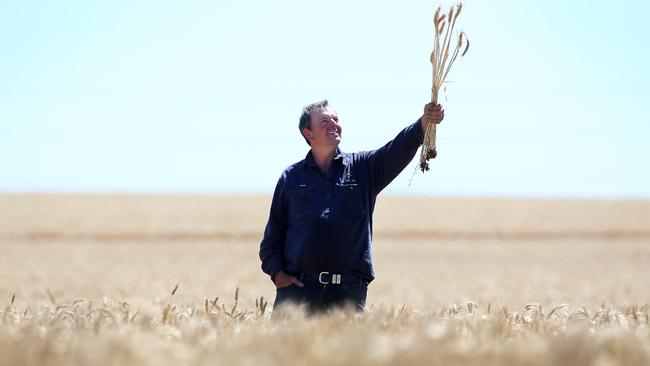
If running a mixed farming business is a juggling act, then one Western District operator is a star performer.
Ben Erwin runs cropping and livestock enterprises across 14 different properties, some he share farms and some he leases and none of which he owns.
It has allowed him to pursue his dream of running an extensive farming business without the exposure of a large capital outlay for land.
Ideally, he’d love to own all the country he farms but the realist in him knows that this doesn’t make sense financially or perhaps even isn’t possible given escalating land values.
Instead, he runs a sharp operation which is so complex even he wonders at times how it all happens.
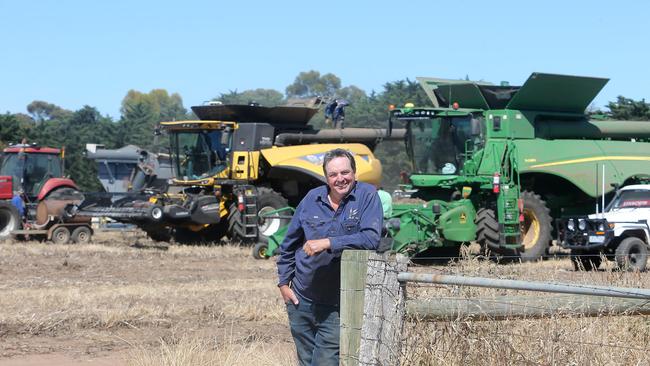
“I’ve built up what I do gradually so I expect that if someone came in and tried to manage it, it would be pretty daunting,” Ben said.
“It is all about maximising the use of the assets I have in terms of machinery across the amount of land I can get access to.”
Each year, Ben crops about 1620 hectares of land across the 14 properties, sticking with rotations that fit each property and soil type.
Most of the properties are within 25 kilometres of each other, and with a wide range of soil types, are grouped together in management, and given similar fertiliser and chemical regimes according to their soil types.
That in turn is not as simple as it sounds.
Quite rightly, Ben said, those properties he share farms on are not always keen to commit to just one crop on their farms, wanting to spread their risk across a couple of crops. This sometimes means he has smaller areas planted to one crop which adds to the management juggle when it comes to sowing and harvesting.
“I work with the property owners, some of which I’ve been dealing with for 20 years, and we establish the rotations that best suit their country,” Ben said.
“I am not one for chasing markets if prices go up for a certain crop – the rotations are pretty much set based on what is best for the land they are on.”
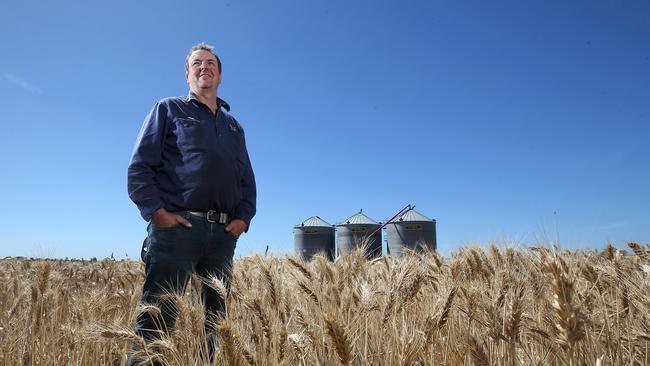
CHOOK BOOSTER
On some of the country, that means beans, canola, wheat, wheat and barley.
Fertiliser inputs are boosted with the application of chicken manure, and then supplemented with some urea but mostly with liquid nitrogen products with trace elements.“ This is a more cost-effective way of applying nitrogen and it doesn’t burn the foliage,” Ben said.
“It’s applying the same amount of nitrogen per hectare, but we are just applying it with our spray rig, and we can apply the trace elements at the same time.
“I still use urea at certain times if a quick response is needed but with the liquid fertiliser, we see great responses to the application over a longer period.”
Ben does the sums carefully on every input into the crop and is looking for a return on investment.
It is all about profitability, he said, rather than chasing the biggest yields in the district.
So saying, his canola has yielded 2.6 to 2.7 tonnes a hectare this season and his faba beans look like yielding four tonnes a hectare. Wheat crops which target the H1 and H2 market, will come in at 3.5 to five tonnes a hectare, depending on which property they are grown on.
Included in the mix are grazing cereals which provide feed for the mob of 1600 Merino ewes, which are joined to Border Leicester rams for first cross production.
Ben has resisted the temptation to go 100 per cent cropping and said the profitability of the sheep operation was what kept it in the mix.
Again, he hedges his bets with the sheep, with 70 per cent of the mob spring lambing and 30 per cent autumn lambing.
LAMB PLANS
It takes some of the grazing pressure off in spring and any of the ewes which do not lamb in spring are swung over into the autumn lambing mob and vice versa. Empty ewes are sold if they are found to be not in lamb two joinings in a row.
“You can either manipulate your lambing to when you have the most feed or try to grow feed to suit when you lamb, and we’ve found the grazing barley is a great feed source, but still keeps the country in a cropping program,” Ben said.
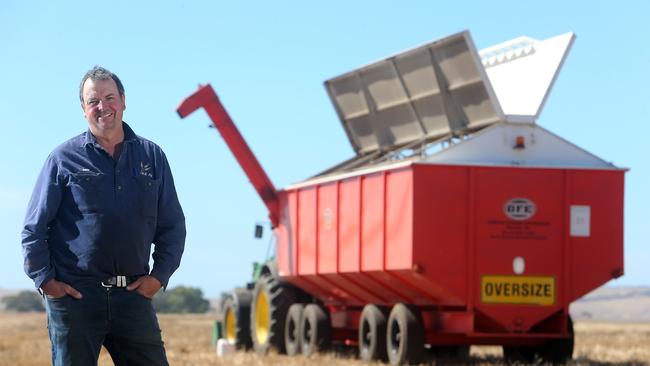
“There is no issue with putting in a grazing crop and not harvesting it, but potentially we could do that if the seasons went with us.”
Again, those sheep are run across eight of the 14 properties, adding to the management challenges.
Ben might not own land, but his extensive machinery inventory allows him to be timely in crop management.
To offset that outlay, he goes contract windrowing in central western NSW each year, a two-to-three-week commitment which generates good income flow and makes better utilisation of his equipment.
“This year, we windowed for 35 different people, so the logistics have to be spot on,” Ben said.
He does own. his own header – “a very expensive commitment” – but does little contract harvesting. The choice to buy his own header made financial sense, he said, to optimise quality with timely harvesting.
Few pieces of his inventory are bought new but are purchased when they are three or four years old.
This dramatically decreases the outlay needed but should still see comparatively few mechanical issues.
“One thing we do is to is to have a dedicated repairs and maintenance program before the season starts, and we make sure that we are as prepared as we can be for the busy times of sowing and harvest,” Ben said.
STABLE APPROACH
In his farming career, Ben admits to trying a range of enterprises and operations, things as diverse as hay contracting and a free-range piggery.
Not all of them were successful and the uncertainty of farming on someone else’s land also meant sometimes the options to continue were not always there.
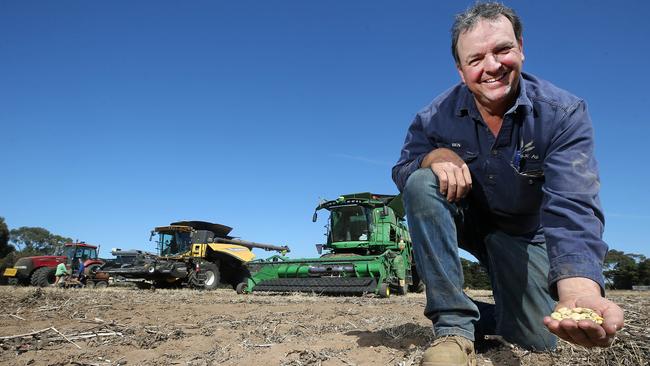
Constantly looking at his business – what works and what doesn’t – is vital despite the hectic work program he has, Ben said.
“We are always looking at what we do and opting to not chases winners,” he said.
“Good strong performers year in year out is what we are after.”
Critical to such a busy farming program are staff, and Ben said his current team had the right mix of youth and experience, blended with a commitment to get the job done.
“Good staff are a blessing, and it is not something I take for granted,” Ben said.
“Everyone knows they have a voice in the discussions we have about the business, regardless of age or position.
“The spread of age groups seems to work really well to get that mix of experience and enthusiasm.”
Underpinning the whole of Ben’s business has to be a level of trust given he does not own the land he farms.
“I have long-term working relationships with many of the properties I lease or share farm, with most of those established for 20 years or more,” he said.
“There is only so much land available to lease though and with agriculture going through a purple patch, it is important to keep those relationships with those people strong.”




